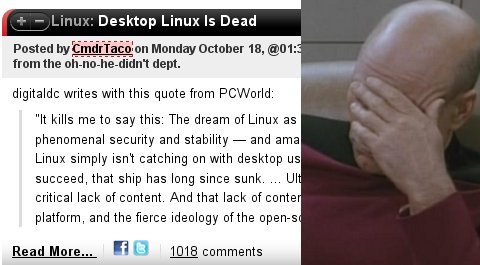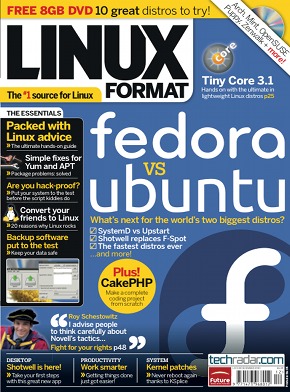10.18.10
Links 18/10/2010: Fusion Linux 14, Debian Live Raves
![]()
Contents
GNU/Linux
-
Audiocasts/Shows
-
Linux Outlaws 169 – Ubuntu-Proof
This week on the show: Ubuntu 10.10 is released, System 76 says Unity is slow and confusing, Black Duck acquires Ohloh, LibreOffice now officially a fork, Fab reviews the O2 Surfstick, Microsoft launches Windows Phone by having Ballmer look stupid and Apple patents a completely obvious sentence.
-
KDEMU – Claudia Rauch
-
‘Pop’ goes OSS
You may still not find many people rooting for Ubuntu for their laptops, but the shift towards open source is palpable.
While we are not quite at the tipping point, we are cruising towards it.
[...]
“They did not know what ‘open source’ meant,” says Mangudi. “While all of them are learning programming languages such as C sharp and the web framework dot net, none of them is exposed to languages such as PHP, which powers Facebook or Ruby, which powers Basecamp.”
-
-
Kernel Space
-
Graphics Stack
-
LunarG Proposes A Shader And Kernel Compiler Stack
LunarG, the consulting company providing professional services for Mesa / Gallium3D that’s led by Jens Owens, the founder of Tungsten Graphics, is beginning to commence work on a new project: LunarGLASS. Last year, LunarG wanted to provided better Linux graphics documentation, but this new LunarGLASS initiative is much more ambitious and it’s about providing a complete shader and kernel compiler stack.
John Kessenich of LunarG has posted a proposal for LunarGLASS on the mesa-dev mailing list. “LunarG has decided to work on an open source, long-term, highly-functional, and modular shader and kernel compiler stack. Attached is our high-level proposal for this compiler architecture (LunarGLASS). We would like to solicit feedback from the open source community on doing this.”
-
Geek Time with Rusty Russell
Free software advocate and Linux developer Rusty Russell sat down for an interview with Google’s Jeremy Allison when they were both in Japan for LinuxCon. They discuss Rusty’s role maintaining the Linux kernel (0:15), why Australia has produced so many top notch open source developers (3:13), and suggestions for people starting out in their careers and looking to get into open source (9:13). Enjoy!
-
-
-
Applications
-
Video editors usage statistics: duty calls
PiTiVi has 25 thousand lines of Python code (22% of which are comments) versus OpenShot’s 8 thousand (33% of which are comments)! Obviously that means our application is better! No wait, does it mean that our application requires more lines of code to do similar things? Damn!
-
Instructionals/Technical
-
Simple tip:How to convert djvu to pdf
-
Apt-Proz And Apt-Metalink: 2 Alternatives To Apt-Fast [Speed Up Apt-Get Download Speed]
-
Apt-Proz And Apt-Metalink: 2 Alternatives To Apt-Fast [Speed Up Apt-Get Download Speed]
-
Video: Nautilus Elementary With ClutterFlow, Embedded Terminal In Ubuntu 10.10 Maverick Meerkat
-
Creating Planets and Planetary Rings in GIMP
-
Firefox / IceCat Tips
-
Backing up Master Boot Record
-
Feather Linux’s stats.pl perl script
-
Development (build-essential) tools Slackware
-
Testing MariaDB on Hardened Gentoo
-
HOWTO: Setting Up a New Ubuntu GNU/Linux Box for Java/CFML Development
-
Change your Grub and Grub2 splash screen in Ubuntu
-
Simple Command Line Utility to Upload and Download files from Megaupload and Rapidshare
-
Nano: Open a file at a specific position
-
Command Line Interface Intro Special Edition
The NEW PCLinuxOS Magazine staff is pleased to announce the release of the Command Line Interface Intro Special Edition of the PCLinuxOS Magazine. The NEW PCLinuxOS Magazine is a product of the PCLinuxOS community, published by volunteers from the community. The magazine is lead by Paul Arnote, Chief Editor, and Assistant Editors Andrew Strick and Meemaw. The NEW PCLinuxOS Magazine is released under the Creative Commons Attribution-NonCommercial-Share-Alike 3.0 Unported license, and some rights are reserved.
-
-
-
Distributions
-
GeeXboX Develops The OpenBricks Framework
The developers behind the GeeXboX multi-media Linux distribution have written in to inform us a new framework they have been developing and just released called OpenBricks. The OpenBricks Embedded Linux Framework is “an enterprise-grade embedded Linux framework that provides easy creation of custom distributions for industrial embedded devices. It features a complete embedded development kit for rapid deployment on x86, ARM, PowerPC and MIPS systems with support for industry leaders.”
-
Red Hat Family
-
Red Hat Enterprise Linux 6 Release Candidate Available to Partners
Back in April, we began talking about the development road toward the availability of Red Hat Enterprise Linux 6 when we delivered the first beta of the platform, with noteworthy improvements spanning performance enhancements to new security features to expanded virtualization capabilities. With the introduction of the first beta, we began working with our customers, partners and the community to test and further develop the release into an ambitious and robust operating platform. Since then, we have continued the momentum of Red Hat Enterprise Linux 6 development with the delivery of a second beta in June with additional updates and technologies. We also recently announced an agreement to certify Red Hat Enterprise Linux 6 under Common Criteria at Evaluation Assurance Level (EAL) 4+ in August.
-
Fedora
-
Fusion Linux 14 will come with TeamViewer remote desktop
After looking at all available remote desktop solution we have found out that TeamViewer for Linux is just best solution out there.
-
-
-
Debian Family
-
Understanding Debian’s release process
Currently, the main product of the Debian project is its stable release. Those release come out approximately every 18-24 months. This article gives a short overview of the process leading to the next stable release.
-
Release Team meeting minutes (and release update)
As previously announced[RT:PM], the Debian Release Team held a meeting on 2 and 3 Oct, 2010 in Paris, France. The meeting was kindly sponsored by IRILL[RT:PMS]. The attendees were Adam D. Barratt (adsb), Luk Claes (luk), Julien Cristau (jcristau), Mehdi Dogguy (mehdi), Philipp Kern (pkern) and Felipe Augusto van de Wiel (faw).
-
New Backports Suite created
-
Debian Live is getting better all the time
Nobody writes much about the Debian Live Project, which went from a bunch of stable images for Intel architectures to offering stable and testing images not just for i386 and amd64 but also for PowerPC, the latter in a time when many distributions (Fedora, Ubuntu) have abandoned the Power architecture almost entirely.
Users of i386 and amd64 can also choose from monthly, weekly and daily builds of Debian Live with GNOME, KDE, Xfce, LXDE or the standard install, and there’s also a Web-based utility to build a custom Lenny, Squeeze or Sid image.
-
State of Squeeze
-
Canonical/Ubuntu
-
Ubuntu Weekly Newsletter Issue 214
-
Is Ubuntu 10.10 the perfect rescue distro?
I liked the fact that you get an automatic preview of .ogg sound files by just hovering over the icon (this feature does not work with MP3s, though).
Firefox (3.6.10) runs fast, too. The dictionary is a nice add-on. Hibernation seems to be working (I am not sure because I was running a Live CD, but the computer reacted as it should have). Both my USB card reader and my MP4 player were supported. Wired network connectivity was perfect. -
Ubuntu, open source apps use on the rise: Linux Users Group
Ubuntu is breaking out from the Linux community into wider mainstream use in Australia, with schools and government agencies leading the charge, according to the Sydney Linux Users Group (SLUG).
-
Flavours and Variants
-
Edubuntu WebLive
Since the Edubuntu 9.10 release, Edubuntu has been available on a DVD that also features a complete Live environment. This allows users to start up an Edubuntu session and try out some of its features before installing.
-
-
-
-
-
Devices/Embedded
-
Phones
-
Nokia/MeeGo
-
The Qt Future – Mobile on Nokia
When Nokia acquired Trolltech, there was a question mark over Nokia’s long term strategy for the Qt framework. Qt for many, is the toolkit behind the KDE desktop and it’s associated applications, so what would a phone company do with it. Over the past years, the strategy has steadily crystallised, and at this years Qt Dev Day, Rich Green, the new CTO at Nokia and first Nokia CTO to speak at the annual Qt developer conference, confirmed that Qt is core to all of Nokia’s plans for mobile applications; “We’re betting the whole company and smartphones on Qt” Green told the audience at the opening keynote.
-
-
Android
-
GPL violation reports in HTC G2 Android phone
There have been various reports and blog posts about HTC again committing copyright infringement by not fulfilling the GPLv2 license conditions in their latest Android phone, the G2.
While at this point I haven’t studied the situation enough in order to confirm or deny any actual violations, let me state this: The number of GPL Violation reports/allegations that we receive at gpl-violations.org on HTC by far outnumber the reports that we have ever received about any other case or company.
-
-
-
Sub-notebooks
-
Dell likely first to deliver Ubuntu Light netbooks
A new report pegs the new Canonical distro of Ubuntu Light for netbooks to begin appearing on shipping Dell netbooks within the next month. Dell is considered the most likely to be the first vendor to launch netbooks featuring the OS, as it currently sells more PCs with Ubuntu than any other manufacturer. The netbook optimized version of Canonical’s Ubuntu 10.10 is able to boot in 7 seconds.
-
-
Free Software/Open Source
-
Redefining “Realistic”
As open source has shown, some of these creative solutions offered models superior to what we had before. In the world of software development, free software redefined “practical” and “realistic.”
-
What open source community?
Foreign Policy had the same debate [log-in required] in 2002 about the phrase “the international community.” They invited a set of practitioners, scholars, and journalists to weigh-in. Although they were thinking in terms of a world filled with sovereign nations, international institutions, and treaties, the debate has some striking parallels.
Let’s start with the negative crowd.
-
Events
-
“Best practices for open source” session at EU Internet of Services meeting
There is something that I mentioned many, many times: EU projects tend to talk about Open Source, but it is sometimes difficult for project managers to really grasp what OSS is, and how it can be used for real – not only during the project lifetime, but afterwards as well
-
Nordic Free Software Award 2010 – 7 days left to nominate
For one more week you can nominate a person, a project or an organisation for the Nordic Free Software Award.
The Nordic Free Software Award given to people, projects or organisations in the Nordic countries that have made a prominent contribution to the advancement of Free Software. The award will be announced during FSCONS 2010 in Gothenburg.
-
Q & A: The Ubuntu Developer Summits
Last week I had a nice email exchange with a good friend of Ubuntu, Professor Michael Terry at the University of Waterloo. We met at UIST 2010, but he and Ivanka Majic have been conferring about design and usability in Ubuntu for a while. Delighted with UIST in general and specifically with conversations Mark, John, and I had with Michael and one of his students, we invited them to UDS in Orlando at the end of October.
-
-
SaaS
-
Open Source And Cloud Computing: Open Source Is The Key To Cloud Economics
Regular readers of this blog know that I am a strong advocate for Open Source in this cloud based world. In fact, I have argued many times here that Open Source is equally important as Open Standards in ensuring the freedom of the users. I am going to push this meme again here quoting a back of the envelope calculation regarding the costs associated with proprietary license path and open source path in the case of a scale-out model.
-
-
Oracle
-
Microsoft trashing OpenOffice is a good thing
The claims made by the ad are not new. There are undertones of political attack in it, only natural given that this is a political season. And since OpenOffice.org doesn’t have the resources to respond, some may consider it unfair.
Please stop the whinging.
Microsoft can advertise the advantages of its product all it wants, but when even a student version costs $84, with the full deal going for almost $700, and OpenOffice.org can be downloaded free, the difference is obvious. (Whether you can get it a little cheaper is not the issue — the fact is Microsoft software costs money.)
Speaking of politics it reminds me a bit of Proposition 16, an attempt by a California utility to maintain absolute control over the market earlier this year. The proponent was a gigantic company with an unlimited budget, the opponents a small collection of consumer advocates with no money.
The consumer advocates won.
People aren’t stupid. I know we’re all trained to think that if one side has money and the other has none, that the side with money is going to win. Not true. When people pay attention all the money in the world won’t change their minds.
And when it’s a choice between spending money on something or downloading it, I like my chances, no matter how many attack ads Microsoft puts out.
-
Oracle wants LibreOffice members to leave OOo council
A group of key OpenOffice.org (OOo) contributors and community members recently decided to fork the project and establish The Document Foundation (TDF) in order to drive forward community-driven development of the open source office suite. Oracle has responded to the move by asking several members of TDF to step down from their positions as representatives on the OOo community council.
-
-
Semi-Open Source
-
Fear and loathing and open core
Bradley M Kuhn published an interest blog post at the weekend explaining why he believes Canonical is about to go down the open core licensing route and heavily criticising the company for doing so.
My take on the post is that it is the worst kind of Daily Mail-esque fear mongering and innuendo. Not only does Bradley lack any evidence for his claim, the evidence he presents completely undermines his argument and distracts attention from what could be a very important point about copyright assignment.
The premise? Mark Shuttleworth has admitted that he plans to follow the open core licensing strategy with Canonical.
The evidence? Mark praises the strategy Trolltech took of selling proprietary licenses.
The problem? Trolltech did not follow the open core licensing strategy. Neither did MySQL, which Bradley suggests inspired Trollech’s strategy.
Both MySQL and Trolltech utilised a dual licensing strategy, which means that the same code base is available under on open source license or a closed source license (also known as “selling exceptions”. This is not open core licensing, although it is related since open core sees vendors dual licensing and offering extensions only available in the closed license version.
A significant difference between dual licensing and open core is that Richard Stallman has explained why, in his opinion, it is okay to sell exceptions to GPL code via a dual licensing strategy. In fact one of the examples he uses is… Trolltech.
-
-
Licensing
-
Interview with Jordan Hatcher
Over the past twenty years or so we have seen a rising tide of alternative copyright licences emerge — for software, music and most types of content. These include the Berkeley Software Distribution (BSD) licence, the General Public Licence (GPL), and the range of licences devised by Creative Commons (CC). More recently a number of open licences and “dedications” have also been developed to assist people make data more freely available.
-
-
Openness/Sharing
-
7 Ways Sharing can Make You Happy
1. Sharing involves reciprocal giving, and the research is full of the benefits of giving, from greater physical health to personal happiness.
-
Toward open source peer-to-peer material production. An interview with Michel Bauwens
Bertram Niessen and Zoe Romano: we are witnessing many examples of small, open enterprises that are becoming competitive on the markets because of their p2p approach (see Wikonomics). Fashion production lays in the middle between material and immaterial production; that’s a great challenge from the point of view of new, open and p2p forms of productions and new type of business models. What are the main issues at stake when material production becomes part of the activity?
-
Open Data
-
Rewired Stately
This is both for programmers over the age of 50 who would like to take part in a rapid development event using open data as well as developers and scrum masters of all ages who would like to get involved in coaching developers in agile programming.
-
-
Open Access/Content
-
Which works enter the public domain in 2011?
Every year on January 1st hundreds of works enter the public domain around the world. So how do we know which works will come of age in 2011?
Like last year we are keen to get a picture of this well in advance so we can start planning celebrations for Public Domain Day 2011 (see here for our round up of the 2010 highlights!).
-
-
Leftovers
-
Special report: Morality put to the test
-
Meritocracies – built to fail
-
Researchers one step closer to ‘bootless’ computer
Transistor technology ‘will essentially give memory some brains’ and reduce power consumption to the point where PCs and phones could stay on all the time
-
PayPal robbed my bank account
PayPal has a pretty bad reputation when it comes to dealing with inbound payments that sit in your ‘paypal account’ pending withdrawal. It’s not unheard of that they freeze your account without provocation and only release the funds up to 6 months later (or not at all, in some cases).
-
Warn HN: When PayPal doesn’t know the meaning of “Donation”…
I write free software. My free software has a “donate” link that goes to the PayPal donation page. The idiots at PayPal froze my account since I couldn’t prove 501(c) exemption (which I don’t have – and more to the point, never claimed to!) and insist that it’s “illegal” to receive donations unless you’re a registered non-profit with 501(c) IRS clearance. All this happened when I changed the name of the account from my name to the name of my website (because I didn’t want my name on the payment page), bringing to their attention my site and PayPal account.
-
Stop the Signature-File Insanity
Today I received an e-mail from a someone who, I would argue, went a little crazy with their signature file — that virtual Rolodex card at the bottom of a message that holds all manner of contact information. Here’s a fictionalized version of what showed up (I’ve changed all of the details to protect the innocent, but the type of content and the line count is the same as what I got), inspired by James Bond novels and movies .
-
With a Little Twitter Help
Surprisingly, I was able to get a lot of work done on the launch during my tours, thanks in part to social media. While on the road, I put out a call on Twitter for someone to help me tweak my launch template—after all, the different audio/hardcover/paperback/e-book choices can be hard to present in a clear way. I offered a limited edition hardcover in exchange, despite warnings that professional designers would be upset by this “devaluation” of their work. A designer named Andrew Crocker came through with a brilliant design and even put together the HTML/CSS template, saving my Web master, Mike Little, some time. I also put together the graphics while I was on German trains and e-mailed them while waiting on platforms, using sporadic blasts of Wi-Fi.
-
eBooks And The Ease Of Self-Publishing
October 19th is the release date for “Draculas,” a horror novel that I wrote with Blake Crouch, Jeff Strand, and F. Paul Wilson. How four guys were able to collaborate on a single narrative is an interesting story, but not as interesting as the way “Draculas” is being released.
Though together we have over sixty years of experience in the print industry and have worked with dozens of publishers, we’ve decided to make “Draculas” a Kindle exclusive. Not only that, but we’re publishing it ourselves.
-
Science
-
Magnetic monopoles imaged for first time
Monopoles – magnets which have just a single pole – were theoretically conceived by the British-Swiss physicist Paul Dirac, who showed in the 1930s that their existence is consistent with quantum theory.
The scientists were able to image the monopoles directly by using the highly intense x-ray radiation from the Swiss Light Source at the Paul Scherrer Institute.
“Some of the most important theories explaining how quantum matter behaves in the universe are based on their existence, but they have eluded direct imaging since they were first theoretically conceived in the 1930s,” says Prof Hans-Benjamin Braun from University College Dublin.
-
-
Health/Nutrition
-
Prostate cancer urine test nears
British scientists have moved a step closer to developing a simple urine test to identify men at risk of getting prostate cancer.
They have discovered that a protein found in urine is affected by a genetic change linked to the cancer.
-
-
Security
-
Defence/Police/Aggression
-
Inside the Lawsuit That Could Ground Deadly CIA Predator Drones
A new lawsuit alleges that Predator drone targeting software was pirated, and emails obtained by Fast Company suggest the CIA knew it was sub-par.
-
When Brute Force Fails
Liberals don’t like talking about crime. The classic answer—fixing the root causes of crime—now seems hopelessly ambitious. And our natural sympathy for the millions ground down by an out-of-control prison system and a pointless war on drugs doesn’t play well with voters, especially when most criminals can’t vote. The general belief seems to be that the problem of crime has been solved—after all, crime levels have dropped dramatically since the law-and-order 80s—and that the real problem now is not too much crime, but too much punishment. If voters don’t agree, it’s because TV news continues to obsess over violent crime even as actual occurrences of it have cratered, leaving behind a population who wants to do even more to crack down on an army of bad guys who don’t really exist. The smartest liberal position on crime seems to be changing the subject and talking about white-collar crime instead (which, as recent economic news has made clear, is a real epidemic).
-
-
Environment/Energy/Wildlife
-
‘Humans will need two Earths by 2030′
Humans are overusing the planet’s resources and will need two Earths by 2030,a new report warns.
According to the Living Planet Report, human demands on natural resources have doubled in under 50 years and are now outstripping what the Earth can provide by more than half; and humanity carries on as it is in use of resources, globally it will need the capacity of two Earths by 2030.
-
NOAA reports 2010 hottest year on record so far*
Following fast on the heels of NASA reporting the hottest January to September on record, NOAA’s National Climatic Data Center has released its State of the Climate: Global Analysis for September.
-
-
Censorship/Privacy/Civil Rights
-
CeBIT: Quarter Of Germans Happy To Have Chip Implants
CeBit: If it means shorter lines at the supermarket, a quarter of Germans would be happy to have a chip implanted under their skin
-
Opt Out of Behavioral Advertising
The NAI Opt-out Tool was developed in conjunction with our members for the express purpose of allowing consumers to “opt out” of the behavioral advertising delivered by our member companies.
Using the Tool below, you can examine your computer to identify those member companies that have placed an advertising cookie file on your computer.
-
Facebook in Privacy Breach
Many of the most popular applications, or “apps,” on the social-networking site Facebook Inc. have been transmitting identifying information—in effect, providing access to people’s names and, in some cases, their friends’ names—to dozens of advertising and Internet tracking companies, a Wall Street Journal investigation has found.
-
-
Internet/Net Neutrality/DRM
-
Ofcom supports Get online week
-
The internet is full. Go away.
We’ve got a successor protocol (IPv6) — it’s been around for years, although nobody uses it much. The IP depletion isn’t going to affect end users signficiantly in the short term; new/low-end ISPs will probably switch from using a pool of dynamically allocated public-facing IP addresses, allocated one per active customer, to doing some kind of transparent masquerading/forwarding, to increase utilization. This will prevent incoming connections to customers … but that could be seen as a benefit, not a drawback. However, there is going to be a problem for businesses and folks who want to run servers. Not to mention being a show stopper for Dynamic DNS services, and facilities like Apple’s “Back to my Mac” (a part of the MobileMe package that lets travelling users get a remote desktop on their home system from wherever they are). And the inevitable migration to IPv6 is going to cause headaches.
-
-
Intellectual Monopolies
-
Intellectual Property Primer – Part One – Trademarks
Trademarks on the other hand, are forever. As long as the mark is in use, it remains the property of the holder (it can also remain their property if it’s not in use for periods of time, check the law in your jurisdiction). The Disney Company holds a trademark on Mickey Mouse. It will still be valid, even if the copyright on a work that features Mickey Mouse expires. Never mind the patent on the camera that was used to shoot the film.
Remember – Trademarks are the oddball of Intangible Property. Unlike Copyrights and Patents, a trademark doesn’t represent a creation, even though creativity was involved in choosing the mark, and designing the logo.
-
Has Harry Potter crossed the line?
The claimant says the Goblet of Fire takes five main plot elements from Willy:
1. a wizard contest
2. the wizards have to work out what their task is
3. they work it out in a bathroom
4. they complete the task using information from helpers
5. the task involves rescuing hostages held by half-human, half-animal creaturesDo these elements add up to a substantial part of Jacobs’s work?
-
Copyrights
-
Response to Janis Nixon re the Hamilton Spectator interview
Microprocessors make copying easy, cheap, and fast. Did you notice how I haven’t talked about computers at all? This is because even if you were to totally destroy every personal computer in Canada, it wouldn’t do you any good. Within days there would be new ones, and they be running on the microprocessors that control your microwave oven, your DVD player, your CD player, your cell phone, your MP3 player, your television, your automobile (which may have up to 40 different processors), your motorcycle, your watch, your game console (there’s one super computer made of PS3 game consoles), your dishwasher, your clothes washer, your clothes dryer, your sewing machine, your guitar amplifier, your digital camera, your digital video recorder, your digital picture frame, your clock radio, your, well, you get the picture. The average house has over a hundred microprocessors, each of which could be used to build a General Purpose Computer. And I know of people who have done this. Anyone with a college education in electronics, or for that matter with a book from the library and a bit of stubbornness can take apart a Microwave oven and make a computer out of the guts.
-
Movie Rental Outfit Hacked, Emails Leaked, Redirected to The Pirate Bay
ACAPOR, a Portuguese organization which represents the interests of local movie rental companies, has been defaced by Anonymous as part of Operation Payback. The ACAPOR website currently shows a message from Anonymous and then redirects to The Pirate Bay. To make the shaming complete, a 640 MB email database of the outfit was leaked and posted to The Pirate Bay.
-
‘Pay me $1.2M’ Officer Bubbles tells YouTube
If ever there was someone who represents the worst in policing it is, IMHO, Officer Bubbles, as Toronto 52 Division constable Adam Josephs (left) is now known around the world.
He had a young woman arrested during Stephen Harper’s billion dollar G20 mutual admiration fest.
Unfortunately for him, the entire incident was video-taped by Nazrul Islam, going viral online so the whole world can watch as he bullies Courtney Wikels, armed and dangerous with a deadly plastic hoop and a jar of soap detergent.
-
Another Massive Email Breach – ACAPOR Emails Reportedly Leaked on The Pirate Bay
There’s been another massive email breach – this time Acapor’s email’s have been leaked onto The Pirate Bay. This comes just moments after ACAPOR’s website was hacked and redirected to The Pirate Bay. We are currently gathering more information and will expand this article as news progresses.
According to Anonymous, Acapor was targeted for their efforts against The Pirate Bay. Their site was attacked earlier today, and apparently exposed a rather ugly security hole. Anonymous also stated, “Acapor wanted to block The Pirate Bay in Portugal. We decided it had to stay up. P.S. Hire real site admins!”
-
CC Talks With Lulu
Our fall campaign is in full swing and superheroes are giving at all levels – as such, it’s a great time to shine the spotlight on some of our most significant donors.
Lulu, the fantastic open publishing platform, is one such organization. Beyond offering creators of all types the means to publish their own work, Lulu offers a CC-licensing option for authors when they are creating their books. Over a million creators have used the service to date with approximately 20,000 titles to Lulu’s catalog each month.
-
Anti-Piracy Company Pirates Queen-Issued Coat of Arms
This year has seen an explosion of companies all trying to cash in on the ‘turn piracy into profit’ mantra. These companies, many of them involving lawyers, are copying other people’s work like crazy – they’re even copying from each other. Today we bring news that one of these companies has taken a Coat of Arms issued by Elizabeth I in 1600, modified it, and used it for their own commercial purposes.
-
Why Won’t Universal Music Let You See The 20/20 Report From 1980 About How The Music Industry Is Dying?
Here’s one for the “sky is falling” folks, who insist the music industry is dying. Orin Kerr, at the Volokh Conspiracy points us to an episode of the TV magazine show 20/20 all about how the music industry is in trouble… way back in 1980. What’s amusing is that the story is the same.
-
Targets of Predatory Lawsuits Fight Copyright Troll in Washington, D.C.
The Electronic Frontier Foundation (EFF) has asked a judge in Washington, D.C., to dismiss copyright infringement claims against two defendants wrongfully ensnared in mass movie-downloading lawsuits.
In an amicus brief filed Friday, EFF argues that the copyright troll behind the suits — a law firm calling itself the “U.S. Copyright Group” (USCG) — is flouting court rules and engaging in unfounded speculation in order to pressure people into paying premature settlements. The American Civil Liberties Union (ACLU), the ACLU of the Nation’s Capital, and Public Citizen Litigation Group joined EFF in the amicus brief.
USCG has filed these suits against approximately 16,000 defendants so far in Washington, D.C., alleging that they participated in unauthorized downloading of films including “Far Cry” and “The Hurt Locker.” Two of the defendants have submitted evidence that they do not live in Washington, D.C., and since neither of the plaintiffs is located there either, the court ordered the plaintiffs to explain why D.C. is the proper place to sue those individuals. EFF and its co-amici filed Friday’s brief to urge the court to dismiss those defendants and put a stop to USCG’s legal gamesmanship.
-
Media Copyright Group Gets Sued by Competitor
Media Copyright Group, which represents various adult companies in a number of BitTorrent John Doe piracy lawsuits, has been hit with a trademark infringement lawsuit by a competitor, U.S. Copyright Group.
Attorneys for U.S. Copyright Group sent a cease-and-desist letter to the Media Copyright Group, claiming trademark infringement.
-
ACTA/Digital Economy (UK
-
Digital Advocacy’s “Weak Ties” Should Not Be Underestimated
Malcolm Gladwell, the best-selling Canadian writer for the New Yorker, recently turned his attention to the use of Twitter, Facebook, and the Internet for digital advocacy. Gladwell dismissed claims that digital advocacy has been an effective tool, lamenting that “people have forgotten what advocacy is about.” He suggested that effective advocacy that leads to broad social or political change requires “strong ties” among people who are closely connected, committed to the cause, and well organized. When Gladwell examined digital advocacy initiatives he found precisely the opposite – weak ties between people with minimal commitment and no organizational structure.
My weekly technology law column (Toronto Star version, homepage version) notes the Gladwell article was published two days after Canada, the United States, the European Union, and a handful of other countries concluded negotiations on the Anti-Counterfeiting Trade Agreement. Although some issues must still be sorted out, the countries have agreed on a broad framework and announced that no further negotiation rounds are planned.
-
Digital Britain and the return of the Stationer’s Company
Last week also occasioned the passage in England of the Digital Economy Bill, which, for the first time, made ISPs legally liable for the actions of their subscribers and imposed on them an affirmative obligation to protect copyrights to which they are not party. The timing of the passage was surely a coincidence. It’s unlikely many in Parliament were aware of date’s significance. But it presented a striking juxtaposition nonetheless.
-
-
-
Clip of the Day
Screencast of OpenShot Video Editor!
Credit: TinyOgg







 Summary: Techrights is in the December 2010 issue of Linux Format Magazine
Summary: Techrights is in the December 2010 issue of Linux Format Magazine
















 Content is available under CC-BY-SA
Content is available under CC-BY-SA